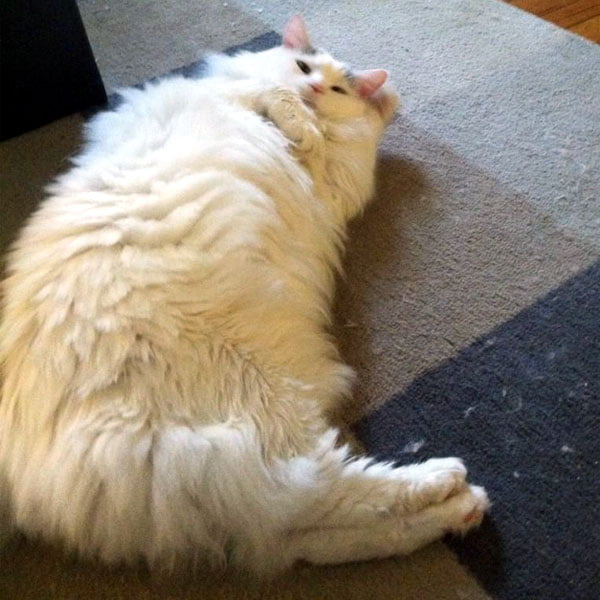People search on the Internet for an answer to the question: What is considered an obese cat? The answer is both simple and not quite so simple. Obesity with respect to cats is defined as greater than 15% above ideal weight. I would expect that that figure surprises most people. I’m sure that the vast majority of people think that the word “obesity” describes a person or an animal who is very much overweight.
Obviously, it is impossible to present a chart which applies to all domestic cats because they are of varying sizes and weights. I believe that most cat owners would be able to visually recognise whether or not their cat is obese based upon the 15% above ideal weight criteria.
A quick test to decide whether your cat is obese or not is to feel your cat’s ribs. There should be a layer of fat over the ribs which provides some padding but not so thick that you are unable to feel the ribs themselves.
Common sense dictates that in the vast majority of cases weight gain is associated with over nutrition which basically means eating more than the cat requires in terms of expenditure of energy.
There are multifarious cat health problems associated with obesity including: respiratory difficulties, decreased cardiac reserve, insulin resistance and the development of diabetes, poor response to infectious diseases, fatty infiltration of the liver, increased surgical risk due to increased risk of anaesthesia, fat necrosis, slower wound healing, technical difficulties in performing the surgery and feline lower urinary tract disease (a study by Hand et al 2000).
In the majority of cases, the failure of a cat to lose weight is due to a failure of the cat’s owner to comply with the veterinarian’s advice or diet or a failure to stick to their own common sense conclusions.



Michael, it is so very nice to see your PoC site again, and I hope you are doing well. I still have my Shrimp taro, still obese, and doing well despite the extra fat. As always, working hard on his diet, just not in the right direction.
It’s not that I’m complacent– I am trying. But, my desire to please him gets in the way of my logical mind. Apparently, I’m so emotionally attached, that I can’t see the “foreboding” for the “please?”
Any sound advice? Thank you!
It’s not that I’m co
Hi Caroline, your comment is very sweet and shows a deep love for your Shrimp. I don’t see a magic wand or a trick. You just have to channel your love for Shrimp into health considerations which means creating a permanent diet which equals or is slighly less than the amount of energy he burns up. A sort of tough love. I know how hard it can be to say no. I struggle too.
I’ve never had a cat overweight problem; but due to illnesses or old age I’ve had almost all my cats with underweight trouble. When I see someone’s obese cat I feel so sorry for it and angry at it’s human(s).
Albert, I too have never had an obese cat, and feel the same way you do when I see one. When I worked in the shelter, we restricted food for the fat cats, and they got grumpy. Probably many were indoor, and used to free feeding of dry food.
For a long time I used to free feed my cat Mitzy, but she never over ate. I did it for my convenience, even though I would give her wet food twice a day. I would hear her nibbling during the night, and thought “at least she’s not waking me up.”
I started cutting back on the amount of dry food, and little by little, I experimented by withholding it completely, and took the chance that she’d wake me at night. If she did, I’d give her a little.
Now, 6 months later, she only gets Rad Cat raw and some canned twice a day. Sometimes, I may give her some before bedtime, if she’s looking at her bowl then at me.
Sometimes she eats more than other times.
She’s a healthy 8.5 pounds. She’s gained a little since I haven’t been able to take her out for her walk on the halter and leash while staying with my friend for the last 5 months. But very soon, we’ll get back in that routine, and get more exercise.
Interesting. Underweight trouble is tougher to deal with. My cat is the thinnest cat I have ever cared for – fighting fit – but in excellent health. He is naturally slender. He looks like just like an African wild cat. I am waiting for him to put on weight – not that he needs to as he a perfect slender cat.